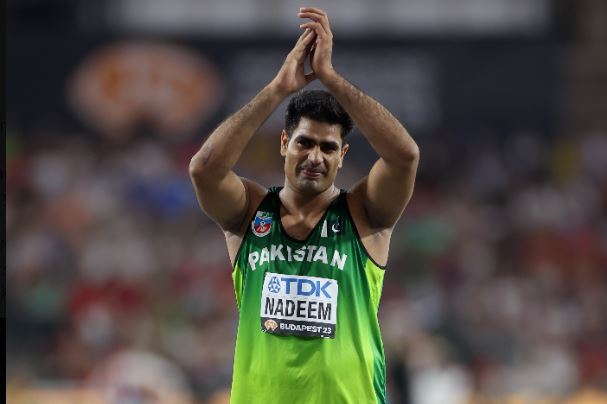
The recent baseless claims made by prominent West Bengal BJP leader Dilip Ghosh against Pakistani Olympic gold medalist Arshad Nadeem are yet another example of the habitual, unfounded accusations leveled against Pakistan by certain Indian officials. Ghosh’s attempt to associate Nadeem with extremist factions, simply because he was seen in the company of Muhammad Haris Dar, an alleged member of Lashkar-e-Taiba (LeT), reeks of desperation and a lack of rationality.
The frustration over Nadeem’s victory against Neeraj Chopra in the Paris Olympics is palpable. Instead of acknowledging Nadeem’s historic achievement—breaking the Olympic record and securing Pakistan’s first Olympic medal in athletics—some in India have chosen to resort to smear tactics, seeking to discredit his victory by linking him to terrorism. This baseless accusation not only undermines the spirit of sportsmanship but also reflects poorly on those who propagate such narratives.
In Pakistan, it is a common practice for achievers to meet with religious figures after significant accomplishments. These meetings are a part of the cultural fabric, signifying gratitude and seeking blessings for future endeavors. Arshad Nadeem’s interactions with religious personalities, such as his meeting with renowned Islamic scholar Maulana Tariq Jamil, should be viewed in this context. It is a gesture of humility and a reflection of the deep-seated faith that many in Pakistan, including Nadeem, hold. To twist this into a narrative of extremism is not only unfair but also illogical.
The accusations against Nadeem are a clear manifestation of the bitterness stemming from his victory over Chopra. Instead of celebrating the spirit of competition and recognizing the talent that exists on both sides of the border, some have chosen to muddy the waters with baseless claims. This not only damages the integrity of the accusers but also tarnishes the sportsmanship that should be at the heart of such competitions.
Arshad Nadeem’s triumph at the Paris Olympics was a moment of immense pride for Pakistan. His performance in the javelin throw, breaking the Olympic record and securing the gold medal, was a testament to his dedication, hard work, and skill. For a country that has often struggled to make its mark in global athletics, Nadeem’s achievement was a beacon of hope and a source of national pride. It brought joy not just to Pakistanis but to sports enthusiasts around the world who appreciate the spirit of competition.
Yet, instead of recognizing and celebrating this achievement, certain Indian officials have chosen to cast aspersions on Nadeem’s character. The suggestion that his interaction with Muhammad Haris Dar, an alleged member of LeT, somehow implicates him in extremist activities is a gross misrepresentation of facts. It is an attempt to tarnish the image of a young athlete whose only crime, it seems, was to outperform an Indian competitor.
It is essential to understand the context of such meetings in Pakistan. The country has a rich tradition of honoring its achievers by inviting them to meet with various dignitaries, including religious leaders. These meetings are often symbolic, serving as a way to offer congratulations and blessings. They are not, as some would like to portray, endorsements of extremist ideologies. Arshad Nadeem’s interaction with religious figures is no different from an Indian athlete visiting a temple or seeking blessings from a spiritual guru. It is a personal and cultural practice, not a political statement.
The broader issue here is the tendency of certain Indian officials and media outlets to use any opportunity to malign Pakistan. This is not a new phenomenon. For years, Pakistan has been the target of baseless allegations, often with little to no evidence to support them. Whether it is accusations of harboring terrorists or claims of involvement in extremist activities, these narratives have become a go-to strategy for those looking to deflect attention from their own shortcomings.
It is important to note that sports should be a unifying force, not a divisive one. The Olympic Games, in particular, are meant to bring nations together in the spirit of friendly competition. Athletes from around the world come together to showcase their talents and compete on a global stage. Their success should be celebrated, not used as a tool for furthering political agendas. By dragging sports into the murky waters of geopolitics, those who make these baseless accusations are doing a disservice not just to the athletes but to the spirit of the games themselves.
In conclusion, the baseless allegations against Arshad Nadeem are yet another example of the habitual, unfounded accusations that some Indian officials make against Pakistan. These accusations are not only unfair but also damaging to the spirit of sportsmanship and to India-Pakistan relations. It is high time that rationality and fairness prevail in such matters. Arshad Nadeem’s victory should be celebrated for what it is—a remarkable achievement by a talented athlete who has brought pride to his nation. Let us not allow baseless accusations to overshadow that. Instead, let us focus on what truly matters—the spirit of competition, the joy of achievement, and the bonds that sports can create between nations.
